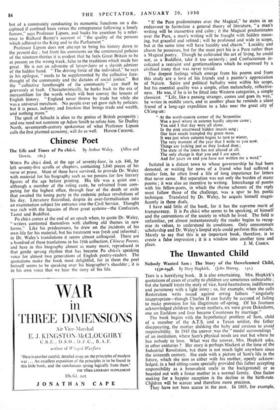Chinese Poet
The Life and Times of Po By Arthur Waley. (Allen and Unwin. :Ss.)
WHEN Po chi'-i died, at the age of seventy-four, in A.D. 846, he left seventy-five scrolls or chapters, containing 3,840 pieces of his verse or prose. Most of these have survived, to provide Dr. Waley with material for his biography such as we possess for few literary figures of the age before printing. His life was a quiet one ; although a member of the ruling caste, he refrained from com- peting for the highest office, through fear of the death or exile that awaited the losing party in the endemic palace revolutions of his day. Literature flourished, despite its over-formalisation into an examination subject for entrance into the Civil Service. Thought was rich with the legacies of three great systems—the Confucian, Taoist and Buddhist.
Po chi'-i comes at the end of an epoch when, to quote Dr. Waley, " writers contented themselves with clothing old themes in new forms." Like his predecessors, he drew on the incidents of his own life for his material, but his treatment was fresh and informal ; in Dr. Waley's translations it seems almost colloquial. There are a hundred of these tranlations in his lq46 collection, Chinese Poems, and here in this biography almost as many more, reproduced in that gentle sprung rhythm that has become Po chi'-i's speaking voice for almost two generations of English poetry-readers. The quotations make the book most delightful, for in them the poet himself seems to be speaking over his biographer's shoulder ; it is in his own voice that we hear the story of his life. " If the Pure predominates over the Magical," he states in an endeavour to formulate a general theory of literature, " a man's writing will be inassertive and calm ; if the Magical predominates over the Pure, a man's writing will be fraught with hidden mean- ing, but graceful and refined ; will be profound and wide in scope, but at the same time will have lucidity and charm." Lucidity and charm he possesses, but for the most part his is a Pure rather than a Magical poetry. Though he cultivated the art of living, he could not, as a Buddhist, take' it too seriously ; and Confucianism in- culcated a restraint and gentlemanliness which he expressed by a civilised irony that was never trivial.
The deepest feelings which emerge from his poems and from this study are a love of his friends and a painter's appreciation of Nature. Satire and political balladry were within his scope, but his essential quality was a simple, often melancholy, reflective- ness. He was, if he is to be fitted into Western categories, a simple classicist. " Life, like a passing stranger, comes and goes its way," he writes in middle years, and in another place he reminds a silent friend of a long-ago expedition to a lake near the great city of Ch'ang-an:
" At the north-eastern corner of the Serpentine Was a pool where in autumn hardly anyone came ; You and I that day were all alone.
In the pink smartweed hidden insects sang ;
Our lean steeds trampled the green moss.
It was just when autumn begins to turn to winter,
The very moment of the year that I write to you now.
Things are looking just as they looked then ; The state of the times has not altered at all.
The only change is that you and I are apart,
And for years on end you have not written me a word."
Isolated in a distant town to whose governorship he had been demoted, or waiting for news of a friend who had suffered a similar fate, he often lived a life of long impatience for letters that never came. But separation was not only the burden of many poems ; it was also an incentive to writing. Interchange of poems with his fellow-poets, in which the rhyme schemes of the reply must follow those of the challenge, was a spur to his poetic technique. Translated by Dr. Waley, he acquits himself magni- ficently in these duels.
I have said little of the book, for it has the supreme merit of transparency: It is Po chi'-i who seems to be speaking, of himself and the conventions of the society in which he lived. The field is unfamiliar, yet almost instantaneously the reader begins to recog- nise its values, to understand its conditions. Only consummate scholarship and Dr. Waley's limpid style could perform this miracle. Merely to say that this is an important book, therefore, is to create a false impression ; it is a window into another time and


































 Previous page
Previous page